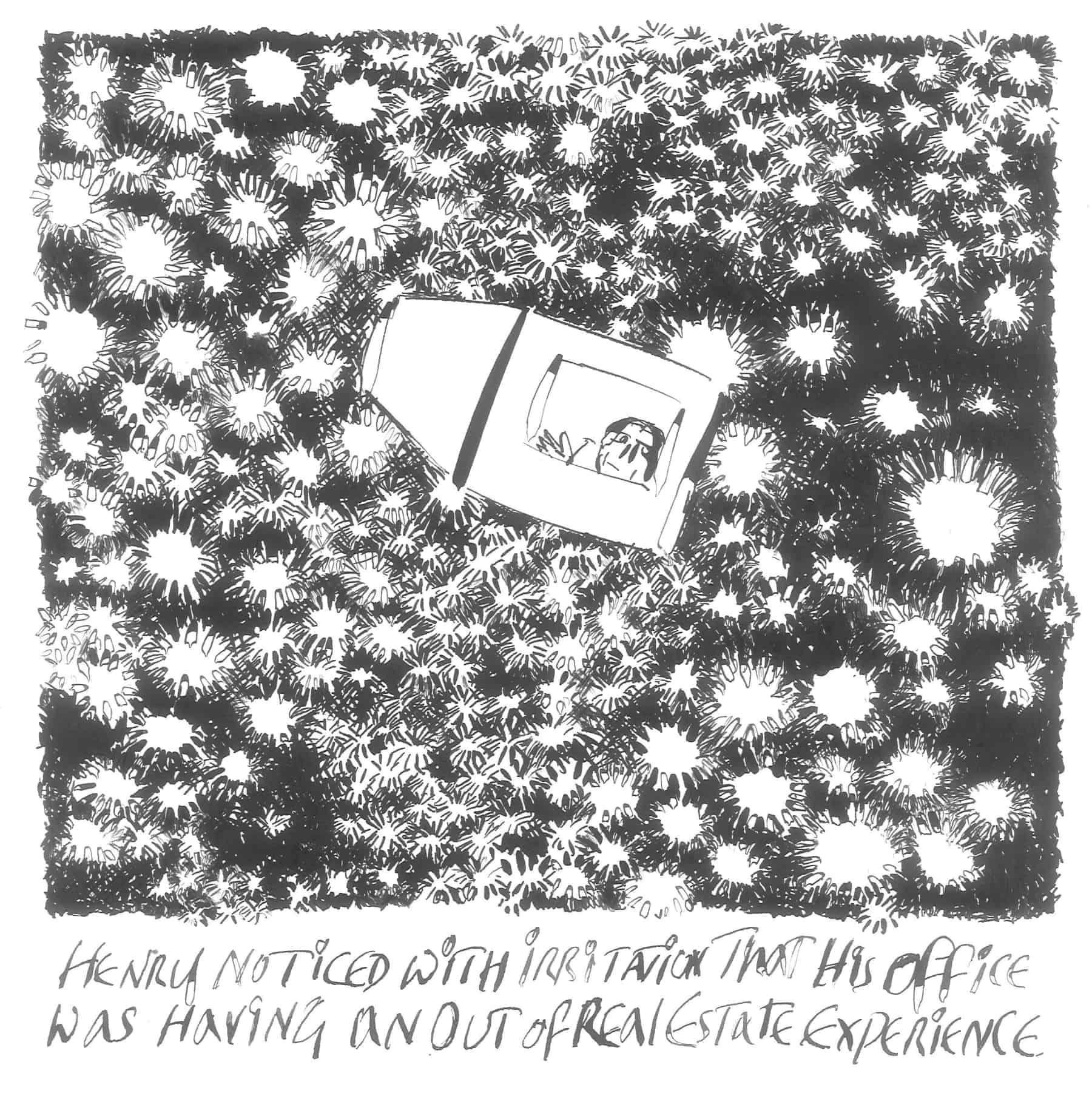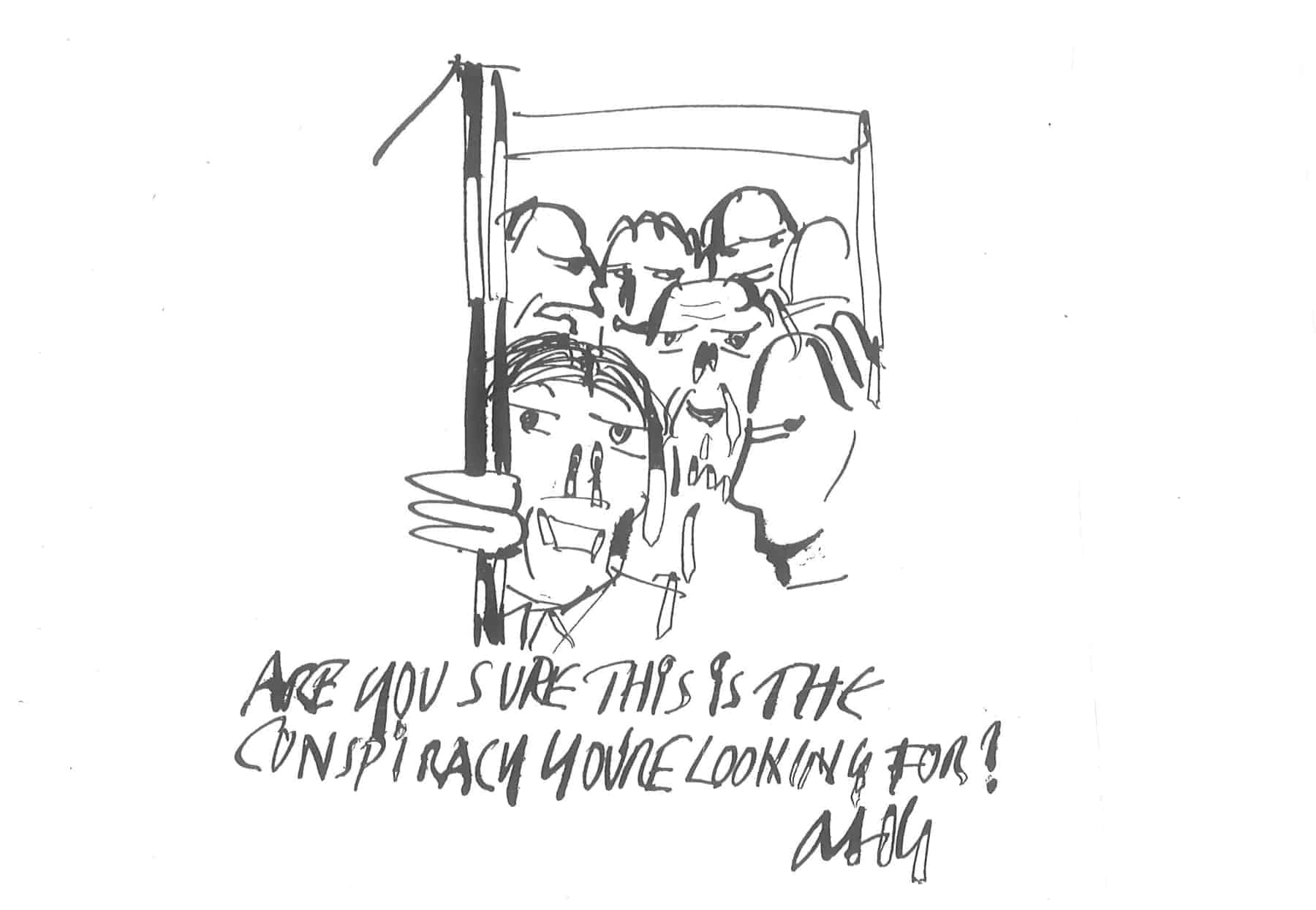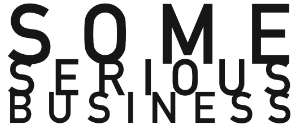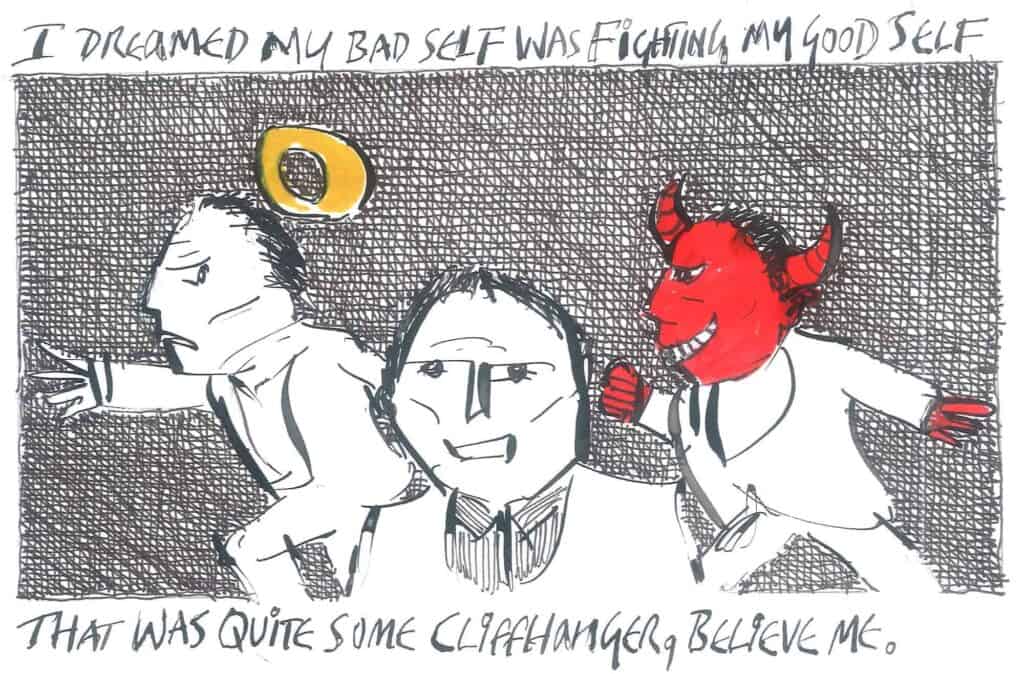All Part of Our #FiftyQuestions Series
Anthony Haden-Guest has spent his life observing, writing, commentating, drawing, satirizing, and making us laugh. His answers below are thoughtful, unexpected, and filled with insights about his creative process, the art world, and the role humor plays in the understanding of ourselves, our society, and the world at large.
He is the inaugural artist and inspiration for SSB’s benefit print series, But Seriously. His cartoon Corporate Culture—drawn spontaneously on a dinner napkin at James’ Beach restaurant in Venice, California in 1995—is a sardonic comment reminding us that not much has changed in the intervening 25 years. Printed on a 100% cotton dinner napkin by Derriere L’Etoile Studios, the lithographs are a hybrid print/poster in an Edition of 50 and are made to be framed or simply push-pinned to the wall. See what’s on offer—including a new print by Karen Finely—in our shop.
Anthony Haden-Guest Answers #FiftyQuestions
What event or factor in your life has been the most pivotal in your decision to become an artist?
I didn’t decide to write and report and draw cartoons. Those were just what I had immediately felt at home doing. If that hadn’t worked out? Yikes!
Describe your ideal workspace.
My ideal workspace is a studio, equipped with the tools I need, tables that can endure spattering, some oddities I enjoy laying eyes on and, indispensably, an organised filing system plus a fluid mess of texts and images within which may lurk ideas.
What one sentence do you hope describes how your art practice will be recorded in history, and why?
I’d like people to say “he made cartoons which hold the page or wall”—as well as fine art without letting the art part slow down and smother the comic idea.
In thinking of the lulls and gaps or lost places in your practice over the years, who or what has re-energized you?
I’m given to multiplicity. An idea may bud from an overheard conversation, printed stuff, whatever.
What project of yours do you personally consider your most satisfying, and why – regardless of external support or accolades?
I’ve been working on it for a while. It’s a multiple narrative with cartoons, text, some animation.
What are habitual internal fears and bogeymen that come up for you around making art – excluding universal concerns of time, space, money, in/adequacy, and recognition?
If I’ve done something I really like a streak of cowardice will often tell me to leave it alone. Luckily though I also suffer from ACD so I just do them over and over and over.
If you could travel in time, within what era or milieu would you most like to have an artist residency? And why? What is your current guiding motivation to work and/or express yourself?
Now’s fine. When better than the End of Days for last laughs? And history has never been happening so fast. Plenty of material.
Who or what would you most like to collaborate with? Do you have a relationship with the distant future – in other words, are you making artwork that bears a message or impact for coming generations?
My relationship with the far-from-distant future is to make stuff AI can’t replicate. Is this possible? AI can already simulate styles and properly programed, will become a gusher of Dadaist jokes. So I would rather like to collaborate with AI. I just know it’ll be a
fertile source. But will AI become able to pick the funny ones itself? Not my problem!

What role does your genetic or cultural background play in your practice?
I grew up the UK where the lack of a sense of humor is considered no laughing matter. That said, Lenny Bruce, the American stand-up icon, bombed when he performed at London’s Establishment Club in the 60s. The New Yorkers were too fast for us, our standuppers would wait for the laugh before telling the next joke. We caught up.
What emotion as an artist makes you most uncomfortable and why?
Neediness! Let me show you my slides … ALL my slides!, all of that.
Can you recall your first memory of bliss in self-expression?
I was, 15 or 16 and in art class at school in Scotland. A grown-up visitor told me he liked my drawing. I still remember that feeling. But not the drawing.
Who has been your greatest mentor, living or dead, real or imaginary?
My art mentor as a young adult in Chelsea, London, was Eduardo Paolozzi, a godfather of Pop with Richard Hamilton. Artists I later both admired and liked enormously, not mentors exactly, but from who I learned a lot, were Christo & Jeanne-Claude and Dennis Oppenheim. I also miss them tremendously.
Do your dark nights of the soul tend to be constructive or destructive to your self-expression? Is destruction a positive phenomenon for you?
Bad things in my life have so often been followed by good things that it’s been a pattern. And occasionally the good things have come directly out of the bad. So, yes, destruction can clear the decks.
What is your artistic relationship to loss? Either personal loss, or lost works of art, or other kinds of loss?
The 19th century Bohemian myth was that the artist lived in a garret, but the work lived forever. Ars longa, vita brevis est. We now know that nowadays both may be short. But we keep on.
If you have one goal for change in your artistic field, what would it be?
I would like to see the resurgence of great cartoonery, by which I don’t just mean funny stuff but also caricature, political comment, etcetera, and which may involve narrative and/or illustration. The likes of Thomas Nast, Aubrey Beardsley, George de Zayas, Al Hirschfeld, Pete Arno, George Herriman of Krazy Kat and Winsor McKay of Little Nemo in Slumberland. Our world of screens would seem a perfect time for a second coming but where are their likes today? My best guess. They are beavering away in the foothills of the way overpopulated art world.
What do you suspect is your most powerful artistic blessing? Or blessing in general?
Endless curiosity. It’s got me into terrific situations and a few ugly ones, but I’ve watched some who lack it congeal into mannerisms and prejudices.
How important is it to you that others connect and understand and appreciate your work?
A provocative question. Simon Rodia, the builder of Watts Towers, must have wanted to connect. Henry Darger? Presumably not. But I make cartoons and if none of you get ‘em, hey, I’m out of here.
What is your relationship to criticism?
First I figure out where the critique coming from. If it’s obviously weird or a socio-cultural maneuver or wholly personal, a kick to the groin, I won’t waste time on it. But if it makes serious points why not pay attention? It may tell me something.
What is your relationship to praise?
A gush is just a gush. Sloppy fun! Words that show attention is being paid are encouraging but words which open a door in your head … ah, that!
Which would you prefer: to be a rogue artistic outsider or to fit within a community of similarly minded creators?
A community of slightly differently minded curators might be more productive.
Are you more interested in the universal or the individual? How important is it to you whether you express yourself as a unique person, or rather add your voice to a collective conversation?
I like the individual. The universal is a zillion individuals you don’t happen to know. Conversation? Yes. Between people though, not a monologue with a captive audience.

If you could be anything besides an artist in human form, what would you like to be?
If I couldn’t be an artist I’d like to be a human artwork. Like, say, Phillipe Petit.
What would be the most thrilling moment or situation in timespace to find your art being enjoyed?
Easy call! This time/space has clearly shot its wad, the signs all indicate that a new Big Bang is about to, well, bang big, and my cartoonery is going to be up front and center. Cosmic question everybody! Should I stick to black and white or journey into color?
About Anthony Haden-Guest
Anthony Haden-Guest is a writer, reporter, and cartoonist. He was born in Paris, grew up in London and has long lived in New York. He won a New York Emmy for writing and narrating a PBS program about the coming of the affluent immigrants—aka Eurotrash—to Manhattan. His books include Bad Dreams (Macmillan); True Colors: The Real Life of the Art World (Grove Atlantic); The Last Party: Studio 54, Disco and the Culture of the Night (Morrow). His most recent book of cartoons and rhymes, Fun Times, was published by Orange Art Foundation. He is currently working on a book and exhibition about the art world.
About #FiftyQuestions
Some Serious Business presents its signature #FiftyQuestions series that highlights folks who are creating, presenting, questioning, and critiquing. Each featured artist or group picks a handful of questions to answer about themselves and their creative process.

